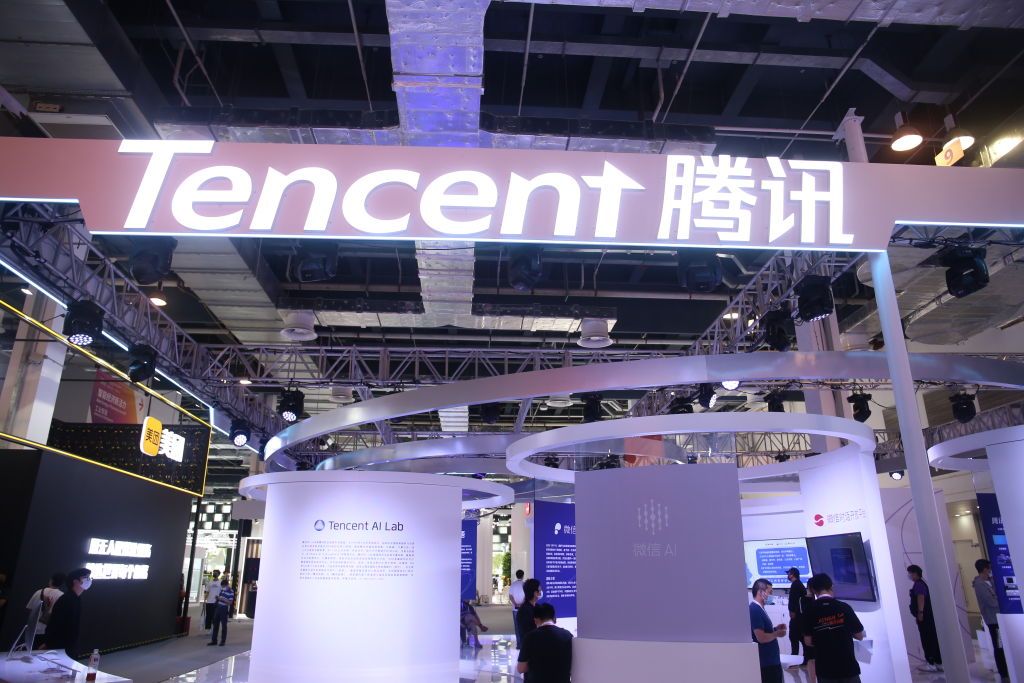
Tencent Holdings Ltd. led a stocks rout after Chinese state media decried the “spiritual opium” of games, prompting the company to broach a ban for kids and triggering fears Beijing will set its sights next on the world’s largest gaming arena.
China’s most valuable corporation joined rivals from NetEase Inc. to Nexon Co. in a gaming selloff after an outlet run by the Xinhua News Agency published a blistering critique of their industry. The Economic Information Daily cited a student as saying some schoolmates played Tencent’s Honor of Kings—one of its most popular titles—eight hours a day and called for stricter controls over time spent. The online link to the post was removed hours later without explanation, though the story remains in the print version.
Tencent then followed up with a pledge to further limit play time for minors—to just an hour during weekdays and no more than two hours during vacations and holidays. That’s a step up from restrictions imposed by China’s gaming watchdog in 2019. It also plans to forbid in-game purchases for under 12-year-olds, starting with its signature title. And more dramatically, the company broached the possibility of the industry banning games altogether for those under the age of 12, without elaborating.
Tuesday’s rapid-fire developments stoked fears Beijing will next train its attention on an arena that’s pivotal to the bottom line of media giants from Tencent to Apple Inc. and Activision Blizzard Inc. They come after a couple of tumultuous weeks for global investors that at one point wiped out more than $1 trillion of market value. Since July, the government has effectively frozen overseas listings to safeguard data security in the wake of Didi Global Inc.’s controversial $4.4 billion IPO, and ordered a swath of after-school tutoring businesses to go non-profit. Those actions demonstrated Beijing’s resolve to go after private enterprises to address social inequities, seize control of data it deems crucial to the economy and stability, and rein in powerful interests.
“China, in this regard, is in uncharted waters and needs to tread the path carefully,” said Aidan Yao, Senior Emerging Asia Economist of AXA Investment Managers. “A lot of the recent market volatility is, in my view, a result of investors not knowing what Beijing is up to, that inadvertently erodes confidence in investing in this market. The latter is a key risk that needs to be carefully managed.”
Tencent dived as much as 11% Tuesday before recouping some of those losses to end 6% lower. Shares in Tencent backers Naspers Ltd. and Prosus NV slid, while Nintendo Co. and Capcom Co. fell alongside Nexon in Tokyo. Many foreign game developers have a licensing deal with Tencent to get their titles into China.
Beijing’s campaign to rein in its giant internet industry is entering its 10th month, a roller-coaster ordeal that’s prompting nervous investors to ponder the longer-term ramifications of a crackdown on firms from Jack Ma’s Ant Group Co. and Alibaba Group Holding Ltd. to Tencent-backed food delivery giant Meituan and Didi. Tencent has now shed about $400 billion of its market value since a January peak.
“The word choice of spiritual opium is especially harsh, it would be surprising if the regulators won’t do anything about this,” said Ke Yan, a Singapore-based analyst with DZT Research.
China’s social media leader has run afoul of regulators in the past, most notably in 2018 when watchdog agencies clamped down on gaming addiction and temporarily suspended monetization licenses, walloping Tencent’s main business. Terms likening games to narcotics have in fact been employed in Chinese media in the past to call attention to the prevalence of gaming among youths, tracing back to the era of PC gaming in cybercafes.
In response, Tencent has restricted playing time for minors and imposed other measures to try and curb addiction. Just last month, it installed facial recognition systems for certain games to prevent kids from using their parents’ IDs to buy in-game items. In the fourth quarter of 2020, minors aged under 18 accounted for just 6% of the company’s Chinese online gaming gross receipts.
“No industry or sport should prosper by eradicating an entire generation,” Tuesday’s article said, citing an academic at a state-backed institution.
—With assistance from Abhishek Vishnoi, Catherine Ngai, April Ma, Ishika Mookerjee and Allen Wan.
More Must-Reads from TIME
- Donald Trump Is TIME's 2024 Person of the Year
- Why We Chose Trump as Person of the Year
- Is Intermittent Fasting Good or Bad for You?
- The 100 Must-Read Books of 2024
- The 20 Best Christmas TV Episodes
- Column: If Optimism Feels Ridiculous Now, Try Hope
- The Future of Climate Action Is Trade Policy
- Merle Bombardieri Is Helping People Make the Baby Decision
Contact us at letters@time.com